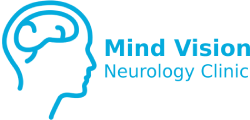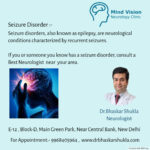Best Neurologist in new delhi, An Experiencing headaches every now and then? Suffering from headaches can be troublesome for many, it gets in the way of day-to-day activities. When you are experiencing throbbing pain in your head, it can be difficult to judge whether it’s a typical headache or a migraine. But by understanding the difference between the two, can help you get the right treatment.
Dr. Bhaskar shukla , Senior Consultant Neurologist, Department of Neurology, PSRI Hospitals, New Delhi about migraines, symptoms, treatment. Read More…https://drbhaskarshukla.com
How to differentiate between a regular headache and a migraine?
Headaches cause pain in one’s head, face, or neck. These lead to pain that ranges from mild to severe. The most common primary headache disorder is a tension-type headache, which feels like a band of intense pressure around the head. Best Neurologist in new delhi for Headache or Migraine treatment.
Migraine is a type of headache disorder that is classified as a neurological condition, associated with recurrent and debilitating headaches of moderate to severe intensity, accompanied by neurological symptoms. Migraine symptoms may begin one to two days before the headache itself, which is known as the ‘prodrome’ stage, which can include food cravings, fatigue or low energy, depression, hyperactivity, irritability or neck stiffness. The migraine attack involves headaches with severe throbbing pain or a pulsating sensation, usually on just one side of the head, which can be accompanied by symptoms such as nausea or vomiting, or extreme sensitivity to light (photophobia) and sound (phonophobia).
Sometimes patients are confused regarding the difference between headaches and migraines, particularly when they attribute migraine symptoms to other assumed causes such as stress, acidity, eye problems, menstruation, and other problems, which can lead to delayed diagnosis.
When should you visit the doctor?
If the headache meets the symptoms of a migraine, or if the headache is affecting one’s daily life or in case of multiple headaches a month that last several hours or days, you should visit a neurologist, who can diagnose and recommend a suitable management or treatment plan. In this type condition you can visit to Dr.Bhaskar Shukla at Mind Vision Neurology Clinic New Delhi.
It is especially important to visit a neurologist early on at the onset of such signs and symptoms, as this can help the condition from progressing to a more chronic migraine or becoming more recurrent and severe. Early diagnosis and disease management are key to this.
Although migraine doesn’t have a cure, a neurologist can help manage the condition better and reduce the frequency and/or severity of the attack and associated symptoms.
What causes migraines?
Best Neurologist for Migraine Treatment in South delhi/ Green Park/ New Delhi. No definitive cause for migraines has been identified. However, certain contributing factors can trigger the condition. Although triggers may vary across a case-by-case basis, common migraine triggers include stress, changes to or an irregular sleep schedule, caffeine or alcohol consumption, and dehydration. Dietary triggers include chocolate, cheese, and dairy products, and foods with a strong smell, amongst other foods and additives. Skipping meals can also trigger migraines. Individuals can also experience environmental triggers, such as bright lights, loud noises, a stuffy environment, or loud noises.
What are the symptoms of migraines?
Migraine symptoms include recurring headaches with severe throbbing pain or a pulsing sensation, usually on just one side of the head, often accompanied by nausea, acidity, vomiting, and extreme sensitivity to light (photophobia) and sound (phonophobia), lacrimation, and giddiness.
Symptoms may also vary across different stages as well as types of migraine (such as if migraine with aura, which can lead to visual, sensory, speech, and other disturbances, often before or during the headache).
Describe migraine pain
Migraine pain is often described as severe throbbing pain or a pulsating sensation, or pounding and debilitating. Some also suggest it can feel like a severe dull, steady ache. The pain may start out as mild, but if left untreated, can become moderate to severe. It usually occurs on one side of the head, although this can shift.
Migraines may last roughly 4 hours, but can also last as long as 72 hours to a week. The pain can be so severe that it interferes with daily activities.
What is the treatment for migraine?
Methods of migraine management and treatment can vary, including preventive therapy. People typically take treatment for acute attacks that aim to stop an attack once it starts and alleviate distressing symptoms. However, there is also a focus on preventing the attack, which can avoid further health complications. This is especially adopted in the case of chronic migraine disorder, which can be painful and debilitating, with attacks occurring 15 or more days a month.
Migraine treatment is patient-oriented, and depends on various factors including presenting symptoms, frequency and severity of the attack, presence of risk factors or comorbidities, patient preference regarding treatment and route of drug administration, as well as whether the patient is taking any other prescribed medication.
Overall, one’s treatment plan includes a combination of lifestyle and behavioural adjustments and prescription migraine medication that is either preventive or abortive or even medication prescribed for specific symptoms such as nausea.
Any home remedies?
Understanding specific migraine triggers can help guide lifestyle and behavioral modifications that can help prevent a migraine. General steps to facilitate prevention can include staying hydrated, ensuring adequate nutrition and avoiding skipping meals, getting quality and consistent sleep, and regularly exercising, although with a gradual warmup.
Additionally, avoiding triggers such as smoking and excessive alcohol or caffeine consumption can also help prevent a migraine. Other at-home remedies to alleviate associated migraine pain can include: lying down in a quiet, dark room, massaging the temple and scalp, and placing a cold compress or cloth over the forehead or behind the neck.
What are the foods that trigger migraines?
Foods that trigger migraines include chocolate, cheese, and dairy products, foods with a strong smell, food additives, such as nitrates (a preservative found in cured meats), and aspartame (an artificial sugar), as well as mono sodium amalgamate (MSG). Tyramine may also act as a trigger, which is often found in fermented or aged foods, like aged cheeses and soy sauce. Additionally, alcohol and caffeine also act as migraine triggers.
What are the different types of migraines?
There are various migraine types. One of the categorizations is a distinction between two of the most common types migraine with aura and migraine without aura.
Migraine Treatment in New Delhi. Migraine without aura is the more common type of migraine. Migraine with aura, which occurs typically in 25% – 30% of people with migraine, is defined when, for at least two attacks, individuals experience an ‘aura’ that is completely reversible, including at least one of the following symptoms: visual disturbances (the most common aura symptom), sensory problems (such as of the body, face or tongue, including numbness, a tingling sensation or dizziness), speech or language problems, eye problems, such as flashes of light, blind spots and other symptoms such as vertigo, tinnitus (ringing in ears), and more. Typically, no aura symptom lasts more than an hour and it typically occurs with the headache, or an hour before the headache begins.
Migraine can also be classified based on the frequency and severity of headaches, into two main types: chronic and episodic. People with chronic migraines generally have a migraine headache for 15 or more days per month, for 3 or more months. Chronic migraine is an especially disabling disorder associated with severe headaches and can have significant effects on one’s quality of life, leading to difficulty in performing daily activities. Episodic migraine refers to those not diagnosed as chronic, characterized by those with migraine headaches up to 14 days a month. Visit our Clinic at Mind Vision Neurology Clinic in Green Park New Delhi. https://drbhaskarshukla.com/headache/





